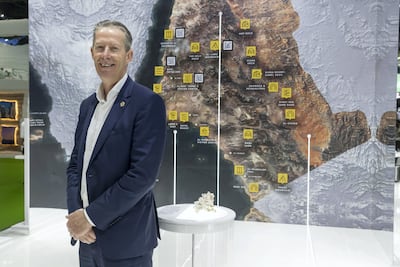Saudi Arabia's Neom — the kingdom's $500 billion city of the future — will have millions of residents by 2030, the project’s head of tourism has said.
People are expected to begin arriving in 2024.
Andrew McEvoy told The National he expected two million “Neomians” to call the city their home by within the next decade.
Mr McEvoy made his comments on the sidelines of the Arabian Travel Market, currently being held in Dubai’s World Trade Centre.
head of tourism, Neom
“From 2024 you will see a lot of movement as our first tourism assets begin to open,” Mr McEvoy said.
“Work is already under way and the tourism projects will start to roll out from then.”
Neom will be home to a number of tourist attractions, including the Trojena mountain destination.
Expected to open in 2026, it will have a ski slope, mountain biking and facilities for watersports. It will also feature an interactive nature reserve.
Neom has been designed as a smart city, which will be powered by clean energy.
It has attracted attention worldwide owing to previously released plans that include flying taxis, classes taught by holographic teachers and an artificial moon, according to The Wall Street Journal.
Mr McEvoy said Neom would be treated as its own state, separate from the rules that govern the rest of Saudi Arabia. This will make it more appealing to people considering relocating there, as well as tourists, he said.
“It’s an appealing destination to a lot of people because it’s a chance to help create a new country almost completely from scratch,” he said.
“It’s fantastic career motivation and there is the backing from the Public Investment Fund to make sure it happens.

“Neom will be treated as a country within a country, with its own economic zone and its own authority. We need to make sure its laws and regulations match the ambitions of those we are trying to attract to work and live here.”
He also said people living there would not be referred as Saudis but would be called by the title “Neomians”.
“We have got about 2,000 Neomians living there already along with about 10,000 construction workers,” Mr McEvoy said.
“A lot of the people coming here to live and work will be experts in the fields of energy, water and health — we’re already attracting a lot of great people.”
Selling alcohol not ruled out
He also refused to rule out the sale of alcohol to try and entice people from other countries to come for work or visits.
“Alcohol is definitely not off the table,” he said.
“We need to be competitive, and to do that, we have to match what competing destinations are offering.”
The project is also on target to be car-free by 2030, he said.
“The city is being built to be completely car-free but I think there will be a slight period of transition,” Mr McEvoy said.
“A lot of the mobility options of the future are out there already, like electric hybrids, and we’re experimenting with things like flying taxis.
“This is about providing the tourism of tomorrow.”
Sustainability is also an important focus for the project. This is being driven by young people who have a more invested role in fighting climate change than previous generations, Mr McEvoy said.
“The most powerful force we have behind this is a new generation of young Saudis who are passionately embracing a new future and see Neom as a beacon of that future.”











